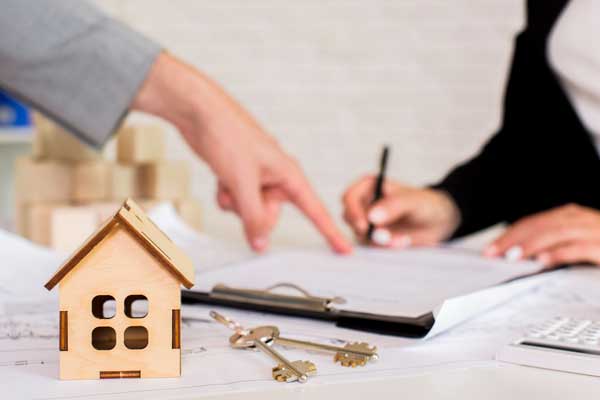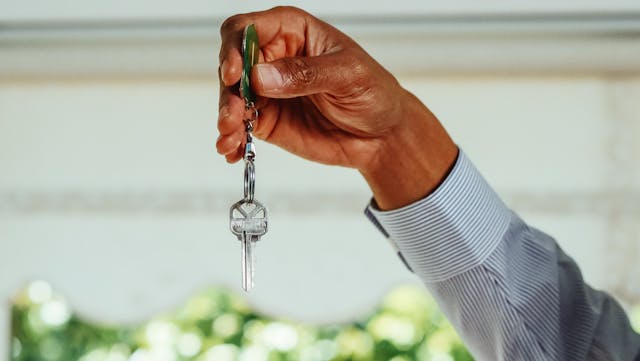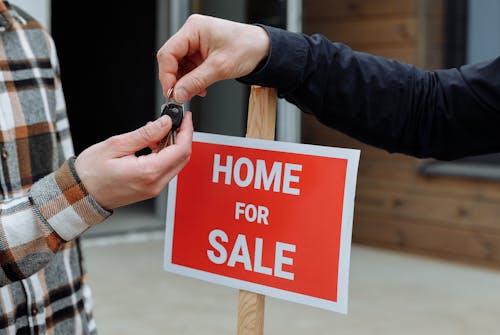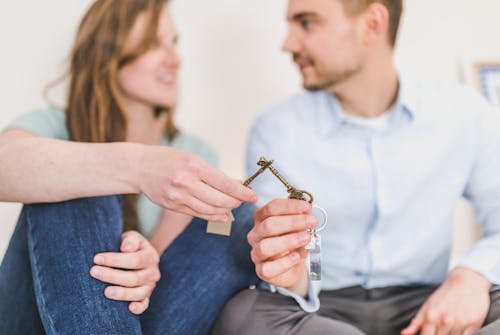How to Buy a House with Bad Credit: Mortgage Options & Tips

Important Takeaways:
Can you buy a house with bad credit? It’s a question on the minds of many aspiring homeowners. The good news is that it may be possible, even if your credit score isn’t perfect. A recent study found that 60% of American renters believe home ownership is out of reach for them, but a low credit score doesn’t have to be a roadblock.
There are loan options and strategies you can use to improve your chances of qualifying for a mortgage with poor credit. However, I’ll likely have to pay higher interest rates and make a larger down payment. The first step is to check yourcredit score and see where you stand.
If you want to buy a home but yourcredit needs to improve, you may worry that you won’t be able to get a mortgage. While having poor credit can make qualifying more difficult and limit your options, it’s not impossible. Let’s explore how to buy a house with bad credit.
What is Considered Bad Credit for Mortgages?
Your credit score is a key factor in determining your eligibility for a mortgage. Let’s take a closer look at what lenders consider “bad credit” and how it affects your home-buying prospects.
Credit Score Ranges
Your credit score is a three-digit number that reflects the risk lenders might face when loaning money to you. It ranges from 300 to 850, with higher scores indicating better creditworthiness. Here’s how FICO, the most commonly used credit scoring model, categorizes credit scores:
| Credit Score Range |
Rating
|
| Below 580 | Poor |
| 580-669 | Fair |
| 670-739 | Good |
| 740-799 | Very Good |
| 800 or above | Excellent |
Mortgage lenders typically consider scores below 580 as “bad credit,” which can make it challenging to secure a home loan. However, there are still options available for those with lower scores, such as FHA loans, which have more lenient credit requirements.
What Lenders Look At
 While your credit score is a crucial factor, it’s not the only thing lenders consider when evaluating your mortgage application. They also look at:
While your credit score is a crucial factor, it’s not the only thing lenders consider when evaluating your mortgage application. They also look at:
- Payment history (35% of FICO score): Late payments, collections, and bankruptcies can significantly impact your credit score and mortgage eligibility.
- Total amounts owed (30% of FICO score): High credit utilization (the amount of credit you’re using compared to your credit limits) can lower your score and make lenders hesitant to approve your application.
- Length of credit history (15% of FICO score): A longer credit history with consistent, on-time payments can help boost your score and improve your chances of mortgage approval.
- Credit mix (10% of FICO score): Having a diverse mix of credit types (e.g., credit cards, installment loans, mortgages) can demonstrate your ability to manage different kinds of debt responsibly.
- New credit (10% of FICO score): Opening several new credit accounts in a short period can temporarily lower your score and raise red flags for lenders.
In addition to these factors, lenders will also consider your income, employment history, and debt-to-income ratio when deciding whether to approve your mortgage application. While having bad credit can make the process more challenging, it’s still possible to achieve your dream of homeownership with the right strategies and loan options. Also, if you are selling a house in Ventura County, we have got you covered.
Home Loan Options for Bad Credit Borrowers
If you’re seeking a home loan with bad credit, don’t lose hope. Several mortgage programs are designed to help borrowers with less-than-perfect credit achieve homeownership.
 FHA Loans
FHA Loans
FHA loans are a strong option if you’re seeking home loans with bad credit. This type of mortgage offers lenient qualifying credit requirements and no risk-based pricing adjustments:
- FHA loans accept applicants with credit scores as low as 500
- Applicants with scores between 500 and 579 need a 10% down payment
- Borrowers with low or bad credit may pay higher mortgage interest rates, but FHA loan rate increases are typically lower than conventional loans
- An upfront and annual mortgage insurance premium (MIP) is required, which adds to the loan’s overall cost
VA Loans
VA loans are among the best options for financing a home for those who qualify, regardless of credit history:
- VA loans do not have a minimum credit score, but lenders typically prefer a minimum of 580 to 620
- Borrowers with lower credit scores get rates comparable to those with higher credit scores
- VA loans are renowned for offering the lowest interest rates available
- A one-time funding fee is included, which most borrowers roll into their closing costs
USDA Loans
USDA loans are designed for low- to moderate-income borrowers in rural areas:
- Minimum credit score of 640 for Section 502 loans
- No down payment required
- Lower mortgage insurance rates compared to FHA loans
- Income limits apply based on location and household size
Conventional Loans
Conventional loans are arguably the most common type of mortgage. Borrowers with low credit scores may wish to consider alternative options because a conventional loan would most likely have higher interest rates and fees:
- A minimum credit score of 620 is generally required
- Loan-level price adjustments (LLPAs) are based on credit score and loan-to-value ratio (LTV)
- Private mortgage insurance (PMI) is required for down payments of less than 20% of the home purchase price
Non-Qualified Mortgages (Non-QM)
If you’re interested in a non-QM loan, check out the specialty mortgage programs some banks and credit unions offer that are neither conventional loans nor government-backed. Or work with a mortgage broker who can recommend products from various lenders that might fit your needs.
First-Time Homebuyer Programs
Many states and local governments offer first-time homebuyer programs that can assist borrowers with low or moderate income or limited credit history. These programs may provide down payment assistance, closing cost assistance, or special low-interest financing options. Eligibility requirements and program details vary by state and municipality. Also, we recommend that you turn new Ventura County property listing alerts through our website.
Low Down Payment Mortgage Options
If you can’t qualify for a no-down-payment mortgage, don’t worry – there are still several low-down-payment options available. These programs allow you to buy a home with as little as 3% down, making homeownership more accessible.
Conventional 97 Loans
The Conventional 97 loan, also known as the Fannie Mae Standard 97% LTV loan, is a great choice for first-time homebuyers. It requires just a 3% down payment and has no income or neighborhood limitations. To qualify, you’ll need:
- A credit score of at least 620
- A debt-to-income (DTI) ratio of 45% or less
- Private mortgage insurance (PMI), which can’t be canceled
At least one borrower must be a first-time homebuyer, meaning they haven’t owned real estate in the last 3 years.
FHA Loans
FHA loans, backed by the Federal Housing Administration, offer down payments as low as 3.5%. They’re designed to help low to moderate-income households achieve homeownership and are popular among first-time buyers. Benefits include:
- Lower credit score requirements (minimum 580)
- Higher debt-to-income ratio allowed (up to 50%)
- Options for those with lower credit scores to qualify
However, FHA loans require mortgage insurance premiums (MIP) for the life of the loan if your down payment is less than 10%. The home must also be your primary residence and meet certain livability standards.
HomeReady and Home Possible Loans
Fannie Mae’s HomeReady and Freddie Mac’s Home Possible programs offer conventional loans with 3% down payments for low to moderate-income borrowers. Key features include:
- Flexible sources of funds for down payments and closing costs
- Reduced mortgage insurance requirements
- Homeownership education to prepare buyers
Income limits apply based on the property location, and at least one borrower must complete a homeownership education course.
Down Payment Assistance Programs
Many states, counties, and cities offer down payment assistance (DPA) programs to help homebuyers cover down payment and closing costs. These programs typically provide:
- Grants that don’t need to be repaid
- Low-interest loans that may be forgiven over time
- Deferred loans with no payments until you sell or refinance
Eligibility for DPA programs varies by location and often depends on factors like income, occupation, and whether you’re a first-time homebuyer. Research programs in your area to see if you qualify.
Steps to Buy a House with Bad Credit
Buying a house with bad credit is possible, but it requires careful planning and preparation. I’ll outline the key steps to help make your homeownership dreams a reality.
 Check Your Credit Reports and Scores
Check Your Credit Reports and Scores
Checking your credit reports is the first crucial step when preparing to buy a house with bad credit. You can request a free copy of your credit report from each of the three major credit bureaus—Experian, Equifax, and TransUnion—once a year at AnnualCreditReport.com. Review your reports thoroughly for any errors or inaccuracies, such as late payments, defaults, or negative marks. If you find any mistakes, dispute them with the relevant credit bureau and provide evidence to support your claim.
Save for a Larger Down Payment
A larger down payment can significantly improve your chances of getting approved for a mortgage, even with bad credit. Lenders prefer to see a loan-to-value ratio (LTV) of 80% or less, as it reduces their risk. While saving for a substantial down payment may be challenging, adjusting your budget and exploring local or state down payment assistance programs can help you reach your goal. Consider putting money into a high-yield savings account each month, cutting back on unnecessary expenses, or taking on a side hustle to boost your savings.
Improve Your Debt-to-Income Ratio
Your debt-to-income ratio (DTI) is another important factor lenders consider when evaluating your mortgage application. A lower DTI, ideally 43% or less, demonstrates that you have a manageable level of debt relative to your income. To improve your DTI, focus on paying down existing debts, such as credit card balances, personal loans, or car payments. Avoid taking on new debt and consider increasing your income through a raise, promotion, or additional part-time work.
Consider Adding a Co-signer
If your credit score and DT you are still holding you back, consider adding a co-signer to your mortgage application. A co-signer, typically a family member or close friend with a strong credit profile, agrees to take on the responsibility of the loan if you default. Having a co-signer can help you qualify for a mortgage and potentially secure a lower interest rate. However, it’s crucial to discuss the risks and responsibilities with your co-signer before proceeding.
Shop Around for Lenders
Different lenders have varying credit score requirements and loan programs, so it’s essential to shop around to find the best fit for your situation. Some lenders specialize in working with borrowers with bad credit, such as FHA loan providers or non-qualified mortgage (Non-QM) lenders. Compare rates, fees, and loan terms from multiple lenders to ensure you’re getting the most favorable deal. Don’t be afraid to negotiate and ask questions throughout the process.
Get Pre-approved for a Mortgage
Before starting your house hunt, get pre-approved for a mortgage. A pre-approval letter shows sellers and real estate agents that you’re a serious buyer and provides a clear idea of how much you can afford to spend on a home. To get pre-approved, you’ll need to provide your lender with documentation such as proof of income, bank statements, and identification. Keep in mind that a pre-approval is not a guarantee of funding, but it’s a crucial step in the home-buying process.
Avoid New Credit and Debt
As you prepare to buy a house with bad credit, it’s important to avoid taking on new credit or debt. Applying for new credit cards, loans, or making large purchases can negatively impact your credit score and DTI, making it harder to qualify for a mortgage. Stay focused on your goal of homeownership and postpone any non-essential financial moves until after you’ve closed on your new home. There are also some country specific rules and regulations and other stuff that you can learn about in our guide for the key differences in Ventura County real estate scene.
Ways to Improve Your Credit Before Buying
Before applying for a mortgage, I’ll work on boosting your credit score to increase your chances of approval and secure better loan terms. Here are some strategies I’ll use to improve your credit:
Dispute Credit Report Errors
I’ll review your credit reports from the three major bureaus (Experian, Equifax, and TransUnion) for any inaccuracies or errors. Common mistakes include incorrect personal information, duplicate accounts, and outdated negative items. I’ll file disputes with the relevant bureau to have these errors removed, which can significantly improve your credit score.
Pay Bills on Time
Making on-time payments is crucial for maintaining a good credit score. I’ll set up automatic payments or reminders to ensure you never miss a due date. Even if you can only afford the minimum payment, it’s better than paying late or defaulting, as this can negatively impact your credit for years.
Reduce Credit Utilization
Credit utilization, the percentage of available credit I’m using, is a key factor in credit scoring. I’ll aim to keep your utilization below 30% by paying down credit card balances and avoiding maxing out your cards. Requesting credit limit increases can also help lower your utilization ratio.
Keep Credit Accounts Open
I’ll resist the urge to close old credit cards you rarely use, as this can hurt your credit score. The length of your credit history and the total available credit are important scoring factors. Keeping these accounts open, even with minimal activity, can help maintain a longer average credit age and lower your overall credit utilization.
Become an Authorized User
If you have a family member or friend with excellent credit, I’ll consider becoming an authorized user on their credit card account. As an authorized user, their account history will appear on yourcredit report, giving your score a boost. However, I’ll make sure the primary account holder has a spotless payment record and low credit utilization before taking this step.
By implementing these credit improvement strategies consistently, I’ll gradually increase your credit score over time. A higher score will not only help qualify for a mortgage but also unlock better interest rates and loan terms, making homeownership more affordable in the long run.
Risks and Drawbacks of Bad Credit Mortgages
 While bad credit mortgages offer a path to homeownership for those with lower credit scores, it’s crucial to understand the potential risks and drawbacks associated with these loans:
While bad credit mortgages offer a path to homeownership for those with lower credit scores, it’s crucial to understand the potential risks and drawbacks associated with these loans:
Higher Interest Rates
One of the most significant downsides of bad credit mortgages is the higher interest rates that lenders typically charge. Because borrowers with lower credit scores are considered higher risk, lenders offset this risk by charging higher interest rates. Over the life of the loan, these higher rates can add up to thousands of dollars in extra interest payments, making the overall cost of the mortgage substantially higher.
Larger Down Payment Requirements
In addition to higher interest rates, bad credit mortgages often require larger down payments compared to conventional loans. While some programs, like FHA loans, allow for down payments as low as 3.5%, many lenders may require a more substantial down payment of 10% or more to compensate for the perceived risk of lending to a borrower with bad credit. This can make it more challenging to save up enough money for a down payment and delay the home buying process.
Stricter Debt-to-Income Ratio Standards
Lenders also tend to have stricter debt-to-income ratio (DTI) requirements for bad credit mortgages. The DT compares a borrower’s monthly debt payments to their gross monthly income, and it’s used to assess the borrower’s ability to manage their debts. For those with bad credit, lenders may require a lower DT you to ensure that the borrower can comfortably afford their mortgage payments along with their other debts. This can limit the borrower’s purchasing power and make it more difficult to qualify for a bad credit mortgage.
Potential for Predatory Lending Practices
Another risk associated with bad credit mortgages is the potential for predatory lending practices. Some lenders may take advantage of borrowers with bad credit by offering loans with extremely high interest rates, hidden fees, or unfavorable terms. It’s essential for borrowers to thoroughly research potential lenders and carefully review the terms of any mortgage offer before signing on the dotted line. Seeking out reputable lenders and programs, such as FHA or VA loans, can help mitigate the risk of falling victim to predatory lending practices.
Limited Loan Options and Flexibility
Finally, bad credit mortgages may come with limited loan options and less flexibility compared to conventional mortgages. Borrowers with good credit often have access to a wider range of loan products, such as adjustable-rate mortgages or jumbo loans, which may not be available to those with bad credit. Additionally, bad credit mortgages may have more restrictive terms, such as prepayment penalties or balloon payments, which can make it more challenging to refinance or sell the home in the future.
Despite these risks and drawbacks, bad credit mortgages remain a viable option for those who are committed to achieving homeownership. By understanding the potential challenges and taking steps to improve their credit and financial situation, borrowers can work towards qualifying for more favorable loan terms and mitigating the long-term costs of a bad credit mortgage. We also have a guide for those who want to buy a house with zero down payment.
Alternatives to Buying with Bad Credit
If you have bad credit, you may feel like buying a house is out of reach. However, there are alternative options that can help achieve homeownership goals:
Rent-to-Own Agreements
A rent-to-own agreement allows you to rent a property with the option to purchase it at a later date. This gives me time to improve credit score and save for a down payment while living in the home you intend to buy. The terms of these agreements vary, but typically, a portion of monthly rent goes toward the eventual purchase price.
Owner Financing
In some cases, the property owner may be willing to finance the sale directly. This means I’d make monthly payments to the seller rather than a traditional lender. Owner financing can be a good option if you have a strong relationship with the seller and we can agree on terms that work for both parties.
Lease Option
A lease option is similar to a rent-to-own agreement, but it’s not an obligation to buy. I’d pay a fee for the right to purchase the property at a set price within a specific timeframe, usually 1-3 years. During the lease period, you can work on improving credit and saving for a down payment. If you choose not to buy, the option simply expires.
Co-Borrowing
If you have a family member or close friend with good credit, you could consider co-borrowing. This means they would apply for the mortgage with me and be equally responsible for the loan. Having a co-borrower with a strong credit profile can improve chances of approval and potentially secure better terms. However, it’s crucial that both parties understand the risks and obligations involved.
Hard Money Loans
Hard money loans are short-term loans from private investors or companies. These loans are based more on the value of the property than credit score. They can be a good option for purchasing a fixer-upper or an investment property. However, hard money loans typically come with high interest rates and fees, so it’s essential to have a solid plan for repaying the loan quickly.
While these alternatives to traditional mortgages can provide a path to homeownership for those with bad credit, it’s important to carefully weigh the pros and cons of each option. In some cases, it may be better to focus on improving your credit score and saving for a larger down payment before pursuing homeownership. By exploring all available options and seeking guidance from financial professionals, you can make an informed decision that aligns with your unique circumstances and long-term goals.
Conclusion
Buying a house with bad credit may seem daunting, but it’s not impossible. By understanding your credit situation, exploring various loan options, and taking steps to improve your financial standing, you can work towards achieving the dream of homeownership. It’s crucial to be realistic about the challenges you may face, such as higher interest rates and larger down payments, but with determination and careful planning, you can overcome these obstacles.
Improving your credit score, saving for a down payment, and shopping around for lenders who specialize in bad credit mortgages can all help me increase your chances of securing a home loan. While alternative options like rent-to-own agreements or owner financing may be tempting, it’s essential to weigh the risks and benefits carefully before committing to any path. With patience, persistence, and a willingness to learn and adapt, you can turn your dream of owning a home into a reality, even with bad credit.
Can you buy a home with bad credit?
Yes, it is possible to buy a home with bad credit. There are specialized home loans for bad credit that cater to individuals with poor credit scores, allowing them to secure a mortgage loan.
What are the options for home loans for bad credit in 2024?
In 2024, options include bad credit home loans such as FHA loans, which are more lenient on credit score requirements. Some lenders may also offer subprime loans specifically aimed at home buyers with bad credit.
What is considered a bad credit score when applying for a mortgage?
A bad credit score is typically considered to be below 580. Many mortgage lenders require a minimum credit score of 620, but some may accept scores as low as 500 for a bad credit mortgage loan.
How can you improve your credit score before applying for a loan?
Improving your credit score can involve paying down existing debts, making all payments on time, and checking for errors on your credit report. Using free credit resources can help you monitor your progress.
What should you look for in a mortgage lender for bad credit home loans?
When searching for a mortgage lender, look for those who specialize in home loans for bad credit. Compare interest rates, fees, and the types of loan products they offer to find the best mortgage for your situation.
Can you qualify for an FHA loan with a low credit score?
Yes, you can qualify for an FHA loan with a low credit score, as the FHA does not require a minimum credit score of 580 for all borrowers. However, a score of at least 500 is generally needed to be approved for a home loan.
What are the risks of getting a mortgage with bad credit?
Risks include higher interest rates and fees, which can lead to higher monthly payments. Additionally, having a poor credit score may limit your options in terms of loan types and amounts you can borrow.
Is it possible to get a home loan without a credit score?
Yes, it is possible to get a home loan without a credit score, but it may be challenging. Some lenders may consider alternative credit data, such as rental payment history, to evaluate your creditworthiness.
How does a bad credit score affect your ability to purchase a home?
A bad credit score can affect your ability to purchase a home by making it more difficult to qualify for a mortgage loan. It may also limit your options for lenders and increase the cost of borrowing.
What can you do if you're denied a home loan due to your credit score?
If denied a home loan, consider taking steps to repair your credit. This may include paying off debts, disputing inaccuracies on your credit report, and improving your credit score over time before reapplying for a mortgage.
